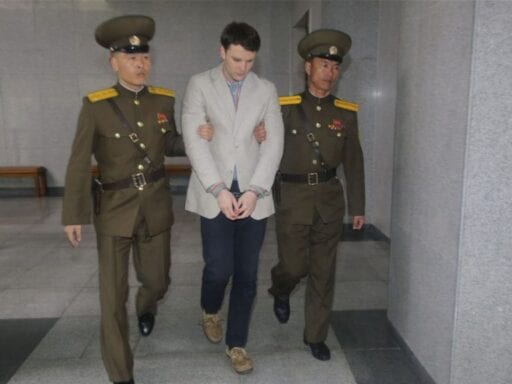Trump has a habit of trusting the word of tyrants.
President Donald Trump can be shamed into (kind of) walking back comments that reflect kindly on known tyrants — all it takes is resounding criticism that overshadows any of his related accomplishments.
After receiving widespread negative coverage of comments he made earlier this week appearing to absolve North Korean dictator Kim Jong Un in the death of Otto Warmbier, a US student who died after being imprisoned in North Korea for over a year, Trump said Friday he was “misinterpreted.”
At a summit between the US and North Korea earlier this week, Trump was asked by reporters if he had confronted Kim about Warmbier’s death. The president confirmed that he did ask about the young American’s mysterious death in 2017, and said he believed Kim “felt badly,” but claimed to have known nothing about it at the time.
It’s highly unlikely that the North Korean dictator wasn’t aware of the high-profile case of an American captive that made headlines around the globe. Still, Trump on Thursday said it wasn’t in Kim’s “advantage to allow that to happen.”
“He tells me that he didn’t know about it and I will take him at his word,” Trump told reporters after the summit held in Vietnam.
A day later, however, Trump backtracked his statement, tweeting that he holds North Korea responsible for Warmbier’s brutal treatment.
I never like being misinterpreted, but especially when it comes to Otto Warmbier and his great family. Remember, I got Otto out along with three others. The previous Administration did nothing, and he was taken on their watch. Of course I hold North Korea responsible….
— Donald J. Trump (@realDonaldTrump) March 1, 2019
Warmbier, a University of Virginia student, was traveling through North Korea in late 2015 when he was detained and accused of stealing a propaganda poster. He was sentenced to 15 years of hard labor. The Trump administration was able to secure his return home in 2017, but he arrived in a severe coma. As Vox reported at the time, “although many have speculated that Warmbier was tortured, leaving him unable to speak, see, or respond to verbal commands, there is no medical evidence proving physical abuse.”
Warmbier’s parents have described in gruesome detail the horrific state their son was in when he’d returned to the US. “It looked like someone had taken a pair of pliers and re-arranged his bottom teeth,” Warmbier’s father Fred told GQ magazine. Warmbier died a short time later at the age of 22.
Trump’s comments were met with rounds of bipartisan criticism for failing to outright condemn Kim’s regime. Sen. Chuck Schumer demanded that he apologize to Warmbier’s parents. Trump’s former UN Ambassador Nikki Haley sub-tweeted him. Sen. Rob Porter took to the Senate floor calling on the president to not be “naive” about the “brutal nature” of the North Korean regime.
Warmbier’s parents, who once praised Trump for securing their son’s release, issued a statement this week railing on the president’s performance at the summit. “Kim and his evil regime are responsible for unimaginable cruelty and inhumanity,” the statement read.
NEW statement from the parents of Otto Warmbier: “Kim and his evil regime are responsible for unimaginable cruelty and inhumanity. No excuses or lavish praise can change that.” pic.twitter.com/c4XStegBRb
— Betsy Klein (@betsy_klein) March 1, 2019
“No excuses or lavish praise can change that.”
Trump has a troubling habit of trusting the word of dictators
It’s worth remembering that Kim is a totalitarian dictator responsible for profound human rights violations. He’s accused of ordering the assassination of his own half-brother, deliberately starving his own citizens and arbitrarily executing top officials with anti-aircraft guns.
That hasn’t stopped Trump from repeatedly referring to Kim as “my friend,” or hailing their “great relationship.” The two leaders are apparently pen pals — Trump boasted of receiving “beautiful letters” from the North Korean dictator.
And Trump’s initial instinct to hold back criticism or condemnation is a move we’ve seen from the president before. Kim isn’t the only dictator for Trump to extend the benefit of doubt.
As Vox’s Aaron Rupar notes, Trump has also been willing to believe Russian President Vladimir Putin, who reputation for overseeing campaigns to kill journalists and political opponents, over his own intel chiefs:
Though the US intelligence community concluded that Russia meddled in the 2016 presidential election on Trump’s behalf, Trump said during a joint news conference with Putin last July that Putin “was extremely strong and powerful in his denial” and hence “I don’t see any reason” to believe the US intelligence community over Putin’s word. Trump’s comments were widely criticized, and he later said he misspoke.
Saudi Crown Prince Mohammed bin Salman, known as MBS, is another unsavory friend of the president. Though Saudi Arabia is a longtime ally to the US, the country is beset by a range of human rights abuses. US intelligence agencies believe MBS was even involved in the murder of Jamal Khashoggi, a journalist who wrote critically of the Saudi government and was likely strangled to death and dismembered last fall.
Trump’s response to the murder: The crown prince says he wasn’t involved, and so Trump is taking his word on it.
See a pattern here?
Author: Amanda Sakuma
Read More



